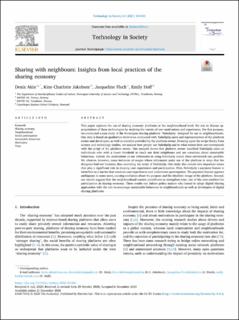| dc.contributor.author | Akin, Deniz | |
| dc.contributor.author | Jakobsen, Kine Charlotte | |
| dc.contributor.author | Floch, Jacqueline | |
| dc.contributor.author | Hoff, Emily | |
| dc.date.accessioned | 2022-03-08T08:11:20Z | |
| dc.date.available | 2022-03-08T08:11:20Z | |
| dc.date.created | 2020-12-21T21:27:12Z | |
| dc.date.issued | 2021 | |
| dc.identifier.citation | Technology in society. 2021, 64:101481 1-12. | en_US |
| dc.identifier.issn | 0160-791X | |
| dc.identifier.uri | https://hdl.handle.net/11250/2983619 | |
| dc.description.abstract | This paper explores the use of sharing economy platforms at the neighbourhood level. We aim to discuss appropriations of these technologies by studying the variety of user motivations and experiences. For that purpose, we conducted a case study of the Norwegian sharing platform “Nabohjelp” designed for use in neighbourhoods. Our data is based on qualitative interviews conducted with Nabohjelp users and representatives of the platform owner and developers, as well as statistics provided by the platform owner. Drawing upon the script theory from science and technology studies, we analyse how people use Nabohjelp and to what extent their use corresponds with the script of the platform owner. Our analysis shows that platform owner inscribed Nabohjelp users as individuals who wish a lower threshold to reach out their neighbours and are conscious about sustainable behaviour. Indeed, the motivations of our informants in using Nabohjelp match these envisioned user profiles. We observe, however, some instances of usages where informants make use of the platform in ways that the designers had not foreseen, thus extending the script of Nabohjelp. Our study also reveals two important issues that play a significant role in shaping user experiences and participation. First, Nabohjelp's payment feature is identified as a barrier that weakens user experiences and undermines participation. The payment feature appears ambiguous to some users, causing confusion about the purpose and the idealistic image of the platform. Second, our results suggest that the neighbourhood context contributes to strengthen trust, one of the core enablers for participation in sharing economy. These results can inform policy makers who intend to adopt digital sharing approaches with the aim to encourage sustainable behaviour in neighbourhoods as well as developers of digital sharing platforms. | en_US |
| dc.language.iso | eng | en_US |
| dc.publisher | Elsevier | en_US |
| dc.rights | Navngivelse 4.0 Internasjonal | * |
| dc.rights.uri | http://creativecommons.org/licenses/by/4.0/deed.no | * |
| dc.title | Sharing with neighbours: Insights from local practices of the sharing economy | en_US |
| dc.type | Peer reviewed | en_US |
| dc.type | Journal article | en_US |
| dc.description.version | publishedVersion | en_US |
| dc.source.pagenumber | 1-12 | en_US |
| dc.source.volume | 64:101481 | en_US |
| dc.source.journal | Technology in society | en_US |
| dc.identifier.doi | 10.1016/j.techsoc.2020.101481 | |
| dc.identifier.cristin | 1862519 | |
| dc.relation.project | Norges forskningsråd: 270737 | en_US |
| cristin.ispublished | true | |
| cristin.fulltext | original | |
| cristin.qualitycode | 2 | |

